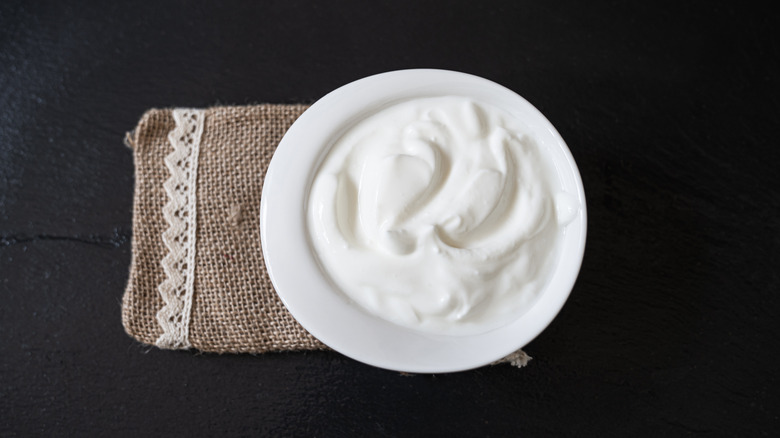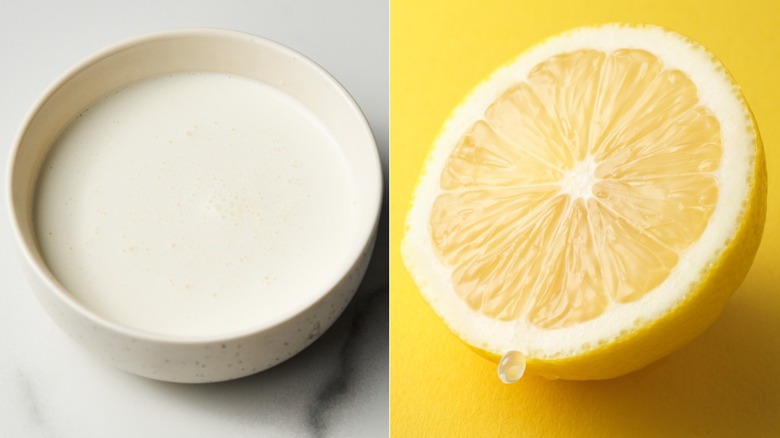Transform Heavy Cream Into Sour Cream With One Easy Addition
Sour cream is more useful in the kitchen than a lot of people give it credit for. It's often thought of as just a condiment, and while it is perfect for topping a big plate of the ultimate chicken nachos, there's so much more that sour cream can do in the kitchen. It is especially underrated as an ingredient in baking, making cake batters moist without thinning them out and balancing sweetness with a hint of tang. You'd be surprised how many recipes end up calling for sour cream, and if you don't have any on hand, you'll need to find a way around the problem.
One option is to approximate the right texture and flavor with a sour cream substitute — but if you have some heavy cream on hand, you can actually make sour cream itself from scratch. All you need to do is mix the heavy cream with a small amount of distilled white vinegar or lemon juice and let it sit, covered at room temperature, overnight. When you return, you'll have a bowl of thick sour cream that you can use to fill any need.
Making homemade sour cream is easy
Sour cream is easy to make at home using heavy cream and an acid like lemon juice or vinegar, as previously mentioned. Here's how to do it: Use one to two teaspoons of acid per cup of heavy cream. You don't need to be too precise; for example, if you just eyeball a squeeze of lemon juice here, you'll be fine. You can also add some milk, up to a quarter of a cup per cup of heavy cream, which is not essential, but will help to better approximate the consistency of the sour cream. If you're familiar with the popular buttermilk substitute that mixes milk with lemon juice or vinegar, this is basically the same thing, but with cream.
When you're letting the cream mixture rest, cover it loosely with a kitchen cloth or another kind of breathable fabric. The cream should sit for at least eight hours, and preferably for a full 24 hours. It's best to keep the cream someplace cool, so avoid direct light. You don't need to keep it in the fridge, because all of the acid you added will keep harmful bacteria at bay. However, after the overnight thickening process is complete, you should keep your homemade sour cream in the fridge in a sealed container, just as you would with the store-bought stuff.
The science behind this sour cream hack
The reason that you can make sour cream from just heavy cream and a bit of vinegar or lemon juice is that this method is a strikingly close approximation of the way commercial sour cream is made. Most of the sour cream you find in restaurants and grocery stores is made via a method called culturing. To produce cultured sour cream, cream is mixed with lactic acid bacteria, which cause the proteins in the cream to coagulate, thickening the texture. This is the same thing that happens when you add a different form of acid, like the citric acid in lemon juice or the acetic acid in vinegar, to heavy cream.
You can make homemade sour cream that is even closer to the cultured variety found in grocery stores if you mix heavy cream with buttermilk. For this, you'll need about a quarter of a cup of buttermilk per cup of cream — although it is admittedly not the most convenient substitute, as you're less likely to have buttermilk on hand than you are vinegar or lemon juice. On the flip side, there are also some sour creams sold commercially that are made with lemon juice and vinegar. In those cases, it's called acidified sour cream, and it's exactly what you're making when you use this simple method.


